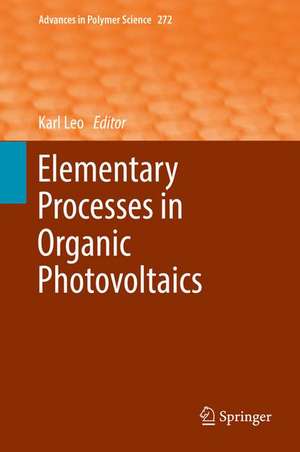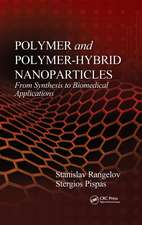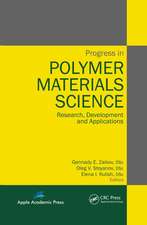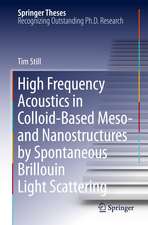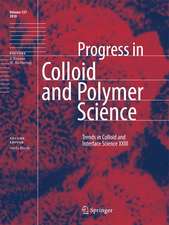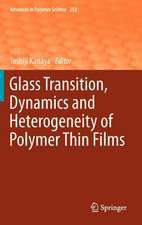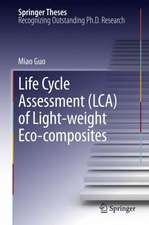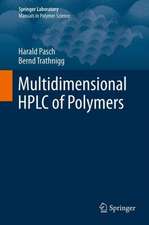Elementary Processes in Organic Photovoltaics: Advances in Polymer Science, cartea 272
Editat de Karl Leoen Limba Engleză Hardback – 30 dec 2016
This volume presents the results of a multi-year research programme funded by the Deutsche Forschungsgemeinschaft (German Research Council), which explains how organic solar cells work. In this new promising photovoltaic technology, carbon-based materials are deposited by low-cost methods onto flexible substrates, thus allowing devices which open completely new applications like transparent coatings for building, solar cells integrated into clothing or packages, and many more. The investigation of organic solar cells is an interdisciplinary topic, covering physics, chemistry and engineering. The different chapters address topics ranging from the synthesis of new organic materials, to the characterization of the elementary processes such as exciton transport and separation, and the principles of highly efficient device design.
| Toate formatele și edițiile | Preț | Express |
|---|---|---|
| Paperback (1) | 950.96 lei 6-8 săpt. | |
| Springer International Publishing – 28 apr 2018 | 950.96 lei 6-8 săpt. | |
| Hardback (1) | 1011.45 lei 6-8 săpt. | |
| Springer International Publishing – 30 dec 2016 | 1011.45 lei 6-8 săpt. |
Din seria Advances in Polymer Science
-
 Preț: 362.74 lei
Preț: 362.74 lei - 20%
 Preț: 549.39 lei
Preț: 549.39 lei -
 Preț: 382.36 lei
Preț: 382.36 lei -
 Preț: 396.24 lei
Preț: 396.24 lei -
 Preț: 386.81 lei
Preț: 386.81 lei -
 Preț: 385.08 lei
Preț: 385.08 lei -
 Preț: 382.75 lei
Preț: 382.75 lei -
 Preț: 382.18 lei
Preț: 382.18 lei -
 Preț: 380.25 lei
Preț: 380.25 lei -
 Preț: 382.75 lei
Preț: 382.75 lei -
 Preț: 387.75 lei
Preț: 387.75 lei -
 Preț: 379.68 lei
Preț: 379.68 lei -
 Preț: 387.75 lei
Preț: 387.75 lei - 15%
 Preț: 636.63 lei
Preț: 636.63 lei -
 Preț: 387.38 lei
Preț: 387.38 lei -
 Preț: 384.86 lei
Preț: 384.86 lei -
 Preț: 389.49 lei
Preț: 389.49 lei -
 Preț: 385.47 lei
Preț: 385.47 lei - 15%
 Preț: 641.20 lei
Preț: 641.20 lei -
 Preț: 379.48 lei
Preț: 379.48 lei -
 Preț: 394.12 lei
Preț: 394.12 lei - 15%
 Preț: 643.00 lei
Preț: 643.00 lei -
 Preț: 386.22 lei
Preț: 386.22 lei - 18%
 Preț: 937.41 lei
Preț: 937.41 lei -
 Preț: 382.57 lei
Preț: 382.57 lei -
 Preț: 387.75 lei
Preț: 387.75 lei -
 Preț: 381.21 lei
Preț: 381.21 lei -
 Preț: 388.34 lei
Preț: 388.34 lei -
 Preț: 386.22 lei
Preț: 386.22 lei -
 Preț: 386.00 lei
Preț: 386.00 lei -
 Preț: 383.33 lei
Preț: 383.33 lei -
 Preț: 384.70 lei
Preț: 384.70 lei - 15%
 Preț: 636.45 lei
Preț: 636.45 lei -
 Preț: 384.48 lei
Preț: 384.48 lei - 15%
 Preț: 634.68 lei
Preț: 634.68 lei -
 Preț: 377.35 lei
Preț: 377.35 lei - 18%
 Preț: 944.19 lei
Preț: 944.19 lei - 18%
 Preț: 1831.60 lei
Preț: 1831.60 lei -
 Preț: 383.50 lei
Preț: 383.50 lei -
 Preț: 386.00 lei
Preț: 386.00 lei - 18%
 Preț: 1220.75 lei
Preț: 1220.75 lei -
 Preț: 385.84 lei
Preț: 385.84 lei -
 Preț: 382.57 lei
Preț: 382.57 lei - 18%
 Preț: 1822.44 lei
Preț: 1822.44 lei - 15%
 Preț: 638.11 lei
Preț: 638.11 lei -
 Preț: 379.09 lei
Preț: 379.09 lei - 15%
 Preț: 635.80 lei
Preț: 635.80 lei
Preț: 1011.45 lei
Preț vechi: 1233.48 lei
-18% Nou
Puncte Express: 1517
Preț estimativ în valută:
193.57€ • 200.55$ • 161.54£
193.57€ • 200.55$ • 161.54£
Carte tipărită la comandă
Livrare economică 21 martie-04 aprilie
Preluare comenzi: 021 569.72.76
Specificații
ISBN-13: 9783319283364
ISBN-10: 3319283367
Pagini: 400
Ilustrații: IX, 421 p. 244 illus., 184 illus. in color.
Dimensiuni: 155 x 235 x 24 mm
Greutate: 0.78 kg
Ediția:1st ed. 2017
Editura: Springer International Publishing
Colecția Springer
Seria Advances in Polymer Science
Locul publicării:Cham, Switzerland
ISBN-10: 3319283367
Pagini: 400
Ilustrații: IX, 421 p. 244 illus., 184 illus. in color.
Dimensiuni: 155 x 235 x 24 mm
Greutate: 0.78 kg
Ediția:1st ed. 2017
Editura: Springer International Publishing
Colecția Springer
Seria Advances in Polymer Science
Locul publicării:Cham, Switzerland
Public țintă
ResearchCuprins
From the contents: Polymeric solar cells: Molecular orientation, structure, and optoelectronic performance.- An integrated approach towards highly efficient bulk-heterojunction solar cells based on dendritic oligothiophenes.- Organic solar cells based on oligothiophene derivatives.- Charge separation at nanostructured molecular donoracceptor interfaces.- p-B-n organic junctions for efficient photovoltaics.- Interplay between microscopic structure and intermolecular charge transfer processes in polymer-fullerene bulk-heterojunctions.- Organic solar cells from optimized self-assembling block copolymers with controlled nanoscale morphology.
Textul de pe ultima copertă
This volume presents the results of a multi-year research programme funded by the Deutsche Forschungsgemeinschaft (German Research Council), which explains how organic solar cells work. In this new promising photovoltaic technology, carbon-based materials are deposited by low-cost methods onto flexible substrates, thus allowing devices which open completely new applications like transparent coatings for building, solar cells integrated into clothing or packages, and many more. The investigation of organic solar cells is an interdisciplinary topic, covering physics, chemistry and engineering. The different chapters address topics ranging from the synthesis of new organic materials, to the characterization of the elementary processes such as exciton transport and separation, and the principles of highly efficient device design.
Caracteristici
Presents a technology for renewable energies Covers the results from the DFG-Schwerpunktprogramm "Elementary Process in Organic Photovoltaics" Written by top researchers in the field
